INTRODUCTION
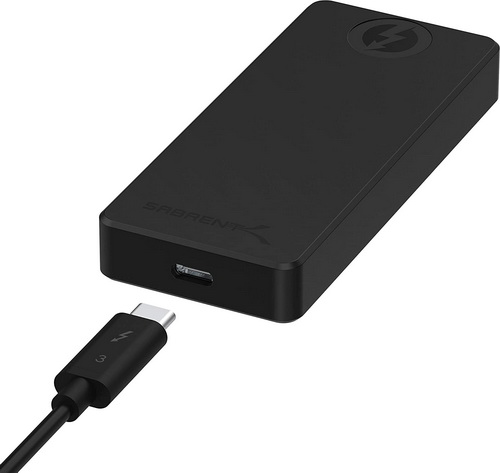
Portable storage media devices are not just getting faster as time goes by, they are also getting smaller, more durable and come at much higher data capacities. Portable SSDs in particular have changed what we all thought possible and so right now consumers can get their hands on models which are significantly smaller than 2.5" HDDs and can be used to store up to 16TB of data with blazing fast transfer speeds ranging from up to 500MB/s for USB 3.2 Gen 1 and up to 1000MB/s for USB 3.2 Gen 2 models and all the way up to 2000MB/s for USB 3.2 Gen2x2 and up to 2500-3000MB/s for Thunderbolt 3/4 models. The Rocket XTRM-Q line of portable SSDs by Sabrent is among the fastest ones currently available for consumers and today with me i have the 8TB variant.
Sabrent is a leading American manufacturer of computer peripherals and accessories, bringing uniquely styled quality products to consumers worldwide. Sabrent’s commitment is to offer the latest technology and the highest quality consumer electronic products at an affordable cost to everyone. Since its founding, Sabrent has consistently delivered to market a full line of computer peripherals and accessories that incorporate style, quality and the latest technologies available.
The Rocket XTRM-Q line of portable SSDs by Sabrent includes 6 different capacities (500GB/1TB/2TB/4TB/8TB/16TB) with either QLC or TLC NAND flash and with USB 3.2 Gen 2 and Thunderbolt 3/4 connectivity for the former and Thunderbolt 3/4 connectivity for the latter (the 8TB capacity model is only available with QLC NAND flash). Sabrent has used a solid aluminum enclosure for that line (only available in black/dark grey color, at least for now) which is not only extremely durable, it also helps with heat dissipation from its internal components. Inside that aluminum housing of the 8TB variant Sabrent has placed no other than their very own Rocket Q M.2 NVMe SSD which uses Phison's PS5012-E12S eight-channel (32 CE targets) NAND controller (this controller sports SLC caching, StrongECC, SmartRefresh, SmartFlush, low density parity check, end-to-end data protection, thermal monitoring, AES-256 encryption and support for ONFi 2.3/3.0/3.2/4.0 and TCG Pyrite/OPAL) together with Micron's 96-layer QLC NAND flash memory and 16GB of DDR3L DRAM. This of course means that the drive itself comes with an MTBF (meantime between failure) of 1.8 million hours and a TBW (Terabytes Written) of 1800 (again, for the 8TB model). As for warranty just like with every other product I’ve reviewed by Sabrent the entire Rocket XTRM-Q line of portable SSDs is covered with a 5-year limited one (upon online registration).
SPECIFICATIONS AND FEATURES

PACKAGING AND CONTENTS
The drive gets shipped inside a large aluminum box that has a paper cover with product picture at the front along with the company logo and its main connectivity.
Moving at the rear we find the product specifications and features right next to another product and of course its capacity.
Removing the paper cover reveals a sticker with one more product picture and the drive capacity.
The drive and its bundle are safely placed inside a formed piece of black foam.
Along with the Rocket XTRM-Q drive inside the box you'll also find an USB-A to USB-C cable, USB-C cable and a quick start guide.
THE ROCKET XTRM-Q 8TB
The solid aluminum body of the Rocket XTRM-Q 8TB measures just 104mm in length, 45mm in width and 8mm in thickness.
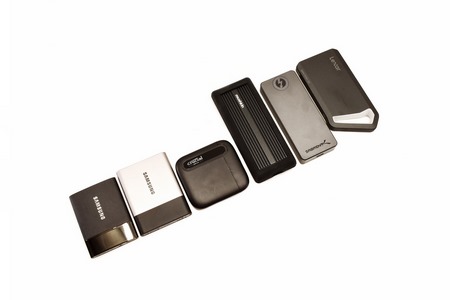
 To have a better idea about the compact size of the Sabrent Rocket XTRM-Q 8TB i placed it right next to the Lexar BLAZE SL660, Mushkin CarbonX, Crucial X6 and Samsung T1/T3 portable SSD drives.
To have a better idea about the compact size of the Sabrent Rocket XTRM-Q 8TB i placed it right next to the Lexar BLAZE SL660, Mushkin CarbonX, Crucial X6 and Samsung T1/T3 portable SSD drives.
The USB-C port is located at the rear of the drive as seen above (a small activity LED is located at the front).
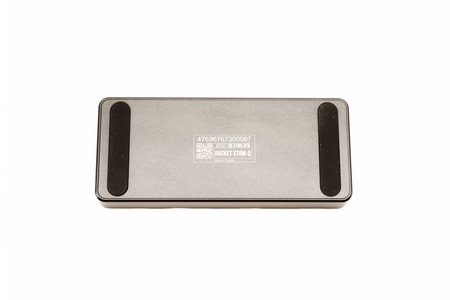
At the base of the drive, we find two rubber feet and a 2D barcode right next to the product name and number.
As mentioned earlier inside the 8TB variant of the Rocket XTRM-Q portable SSD Sabrent has placed none other than their very own Rocket Q 8TB M.2 NVMe Gen3x3 SSD.
TEST BED
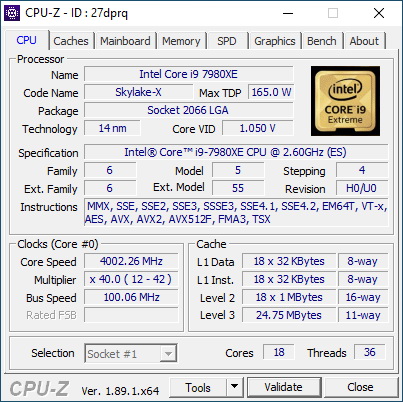

TESTING METHODOLOGY
Solid state drives are basically the same as USB flash drives and so we’re using almost the same testing methodology to successfully record achieved read & write performance numbers in our charts*. The benchmark suites used are HD Tach RW (Read Speeds / Long Bench 32mb Zone Testing), HD Tune Pro (Read / Write speeds), Sisoftware Sandra Titanium 2020 (Read / Write speeds), AIDA64 Engineer Edition (Average Linear / Random Read & Write speeds), Crystal Disk Mark 6.0.2 (2GB Read / Write speeds) and finally ATTO 4.00.0F2 (Max Read / Max Write speeds). Every test is repeated a total of 6 times after which the average performance numbers are recorded into our charts (0 = we were unable to complete that test).
All tests are performed with our main rig running Microsoft Windows 10 Pro installation on a CORSAIR MP510 960GB NVME SSD* with all updates installed up to the day we started tests.
* Since August 2019 for portable SSD tests I started using the X299 test rig.
** For USB 3.2 Gen2x2 portable SSDs I’ll be using the Z590 DARK based test rig.
TEST RESULTS - AIDA64 / ATTO


TEST RESULTS - HD TACH RW / HD TUNE PRO

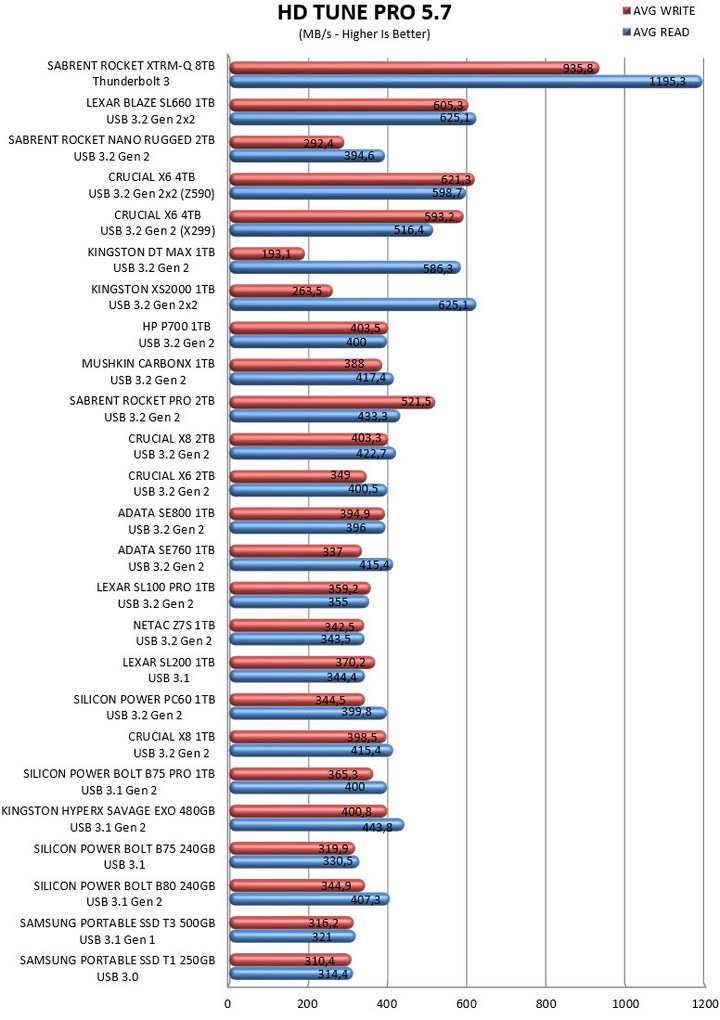
TEST RESULTS - SISOFTWARE SANDRA TITANIUM / CRYSTAL DISK MARK


CONCLUSION
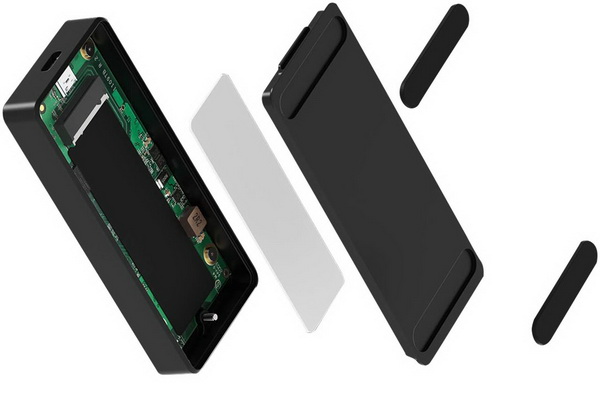
Purely for reasons of cost Thunderbolt 3 was never a widespread connectivity in the PC community/market and I for one always thought that it was a waste of a rather impressive technology. I mean just look at today’s charts, the Rocket XTRM-Q easily surpassed every other portable SSD in them and it’s not even the fastest model of the XTRM-Q line by Sabrent (the 16TB variant has two 8TB Rocket Q M.2 NVMe SSDs in RAID 0 configuration). Thankfully the arrival of the new and slightly improved Thunderbolt 4 connectivity may change things for the better so more PC consumers can take advantage of the data transfer speeds offered by it. Performance aside there’s not much else I can say about the Rocket XTRM-Q portable SSD by Sabrent. Build quality is pretty much excellent and as for temperatures the Rocket Q SSD does run hot but luckily it transfers most of that heat onto the solid aluminum enclosure (which means that the enclosure runs quite hot after just a few minutes of intense read and write operations).
Even though availability seems to be low for the 8TB variant of the Rocket XTRM-Q portable SSD you should be able to find it soon for around USD1400 inside the USA (Amazon.com) and for around 1500Euros inside the EU (Amazon.de). Needless to say, the Rocket XTRM-Q line is not really aimed towards casual consumers and gamers but still it’s a very expensive piece of hardware with a somewhat limited target audience. That being said if you need lots of storage capacity on the go in a tiny format and performance is really crucial for you then the Sabrent XTRM-Q is probably your best choice which is also why it gets the Platinum Award.

PROS
- Build Quality (Solid Aluminum Enclosure)
- Excellent Performance (Surpasses 2650MB/s)
- Design / Size
- Available Capacities (500GB/1TB/2TB/4TB/8TB/16TB)
- Compatibility (Thunderbolt 3 / USB Gen 3.2 Gen 2)
- 5 Year Limited Warranty
CONS
- Price (For Some)
- Current Availability

 O-Sense
O-Sense





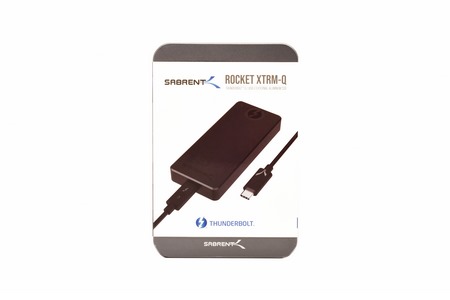




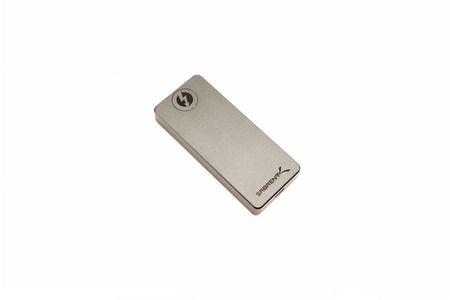


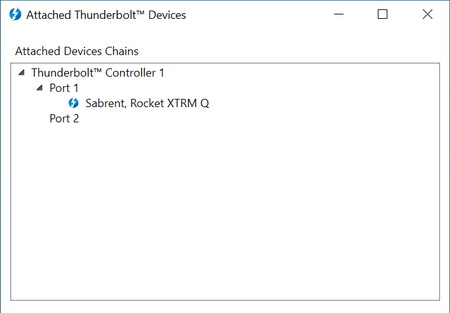


.png)

